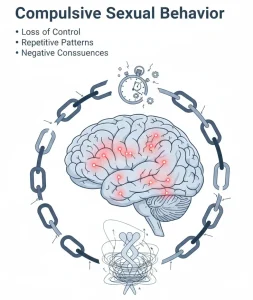Overview
Diagnosis
If you think you might have compulsive sexual behavior, you can ask your healthcare provider for a referral to a mental health professional experienced in diagnosing and treating this condition. You can also reach out directly to a licensed mental health provider.
A mental health assessment may include discussion about:
-
Your physical and mental health and overall emotional well-being.
-
Sexual thoughts, urges, or behaviors that feel difficult to control.
-
Use of alcohol or recreational drugs.
-
Family background, social life, and relationships.
-
Problems or concerns caused by your sexual behavior.
With your permission, your provider may also request input from family or close friends to gain a broader understanding of your situation.
Making a diagnosis
There is still debate among experts about how to define compulsive sexual behavior. It’s not always easy to determine when sexual activity becomes a disorder.
The DSM-5-TR does not list compulsive sexual behavior as a specific diagnosis. However, some professionals consider it a form of impulse control disorder or behavioral addiction.
In the ICD-11, the World Health Organization classifies it as an impulse control disorder.
Mental health experts generally view compulsive sexual behavior as excessive or uncontrollable sexual activity that causes distress or life problems. Because there are no universally accepted criteria, diagnosis and treatment from an experienced professional are recommended for best results.
Treatment
Treatment focuses on managing urges, reducing harmful behaviors, and promoting healthy sexual relationships. It often involves psychotherapy, medication, and self-help or support groups.
If you also have anxiety, depression, or substance use issues, treating those conditions is an important part of recovery. People with severe addiction or who pose a danger to others may need inpatient or residential care at the start of treatment.
Talk therapy
Psychotherapy helps you understand and manage compulsive sexual behavior. Common approaches include:
-
Cognitive behavioral therapy (CBT): Helps identify and replace harmful thoughts and behaviors. You also learn practical strategies to manage urges and reduce secrecy.
-
Acceptance and commitment therapy (ACT): Focuses on accepting urges while choosing actions that align with your personal values.
-
Mindfulness-based therapy: Encourages awareness of thoughts and emotions, reducing anxiety and depression.
-
Psychodynamic psychotherapy: Explores unconscious motivations and helps resolve emotional conflicts.
Therapy may be done individually, in couples or family sessions, or in group settings, and can be conducted in person or online.
Medicines
Some medications may help manage compulsive sexual behavior by altering brain chemicals related to obsession and reward. The best choice depends on your symptoms and other mental health conditions.
Common options include:
-
Antidepressants: Used for depression, anxiety, or obsessive-compulsive disorder; may reduce compulsive urges.
-
Naltrexone (Vivitrol): Often used for alcohol or opioid dependence; blocks pleasure centers in the brain linked to addictive behaviors.
-
Mood stabilizers: May reduce sexual urges, especially in people with bipolar disorder.
-
Anti-androgens: In men, these drugs reduce the effects of male sex hormones and are sometimes prescribed when behavior poses a risk to others.
Self-help groups
Support groups based on the 12-step model (such as Sex Addicts Anonymous) can offer guidance and accountability. These groups can help you:
-
Understand your condition.
-
Learn coping skills and strategies to prevent relapse.
-
Find peer support from people with similar experiences.
Groups can meet locally or online. Choose one that feels comfortable and trustworthy, and ask your provider for recommendations.
Coping and Support
Self-care is an important part of managing compulsive sexual behavior. Helpful strategies include:
-
Following your treatment plan and attending all sessions.
-
Learning more about the condition to better understand triggers and treatment.
-
Identifying what drives your urges and avoiding risky situations.
-
Limiting access to pornography or environments that promote sexual temptation.
-
Seeking treatment for coexisting issues such as alcohol or drug misuse.
-
Finding healthy outlets such as exercise, hobbies, or creative activities.
-
Practicing relaxation methods like yoga, meditation, or deep breathing.
-
Staying motivated by focusing on your recovery goals and repairing relationships.
Preparing for Your Appointment
You can begin by talking to your primary care provider for a physical exam and referral to a qualified mental health specialist. You can also contact mental health centers or trusted online resources directly.
Before your appointment, prepare:
-
Notes about your sexual behaviors, frequency, and triggers.
-
Information on any related problems—legal, relationship, work, or health.
-
Details about any mental health issues such as depression or anxiety.
-
Honest information about alcohol or drug use.
-
A list of all medications and supplements.
-
Questions you’d like to ask your provider.
Questions to ask include:
-
Why do I keep engaging in these behaviors despite feeling bad afterward?
-
How can I manage my urges more effectively?
-
What treatments or therapies would help me most?
-
Would joining a support group be beneficial?
What to Expect from Your Doctor
Your provider may ask questions such as:
-
When did you first notice sexual urges or behaviors that felt out of control?
-
Have these behaviors caused problems in your life or relationships?
-
Do you feel the behaviors are becoming more frequent or extreme?
-
What situations increase or decrease your urges?
-
Have you experienced or caused harm due to these behaviors?
-
Do you have other mental health conditions or addictions?
Advertisement

